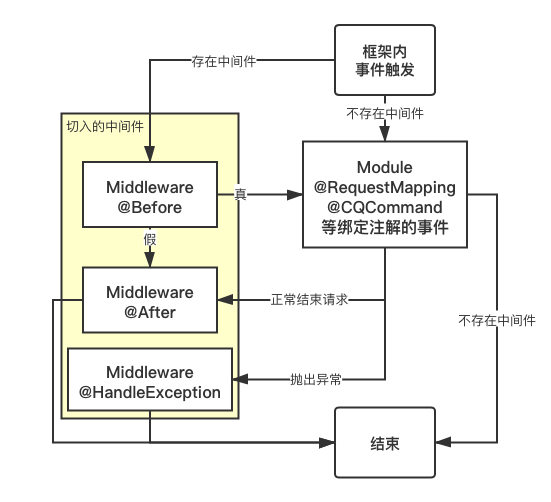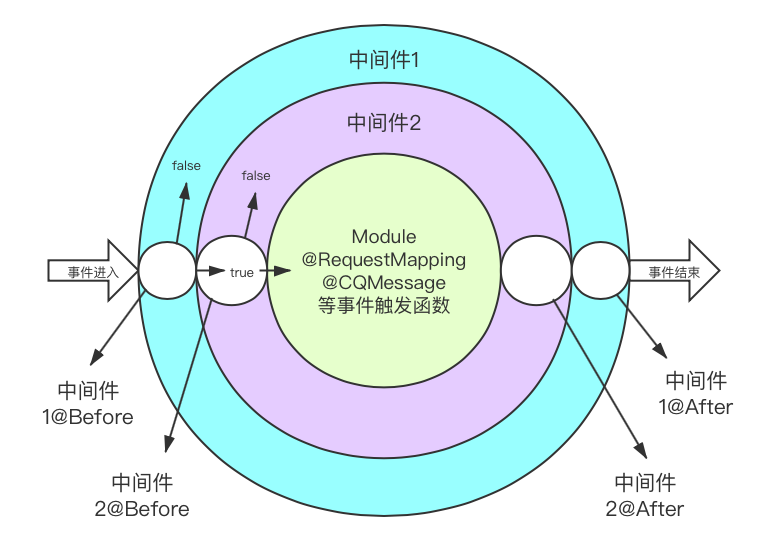# 中间件注解
对于 @RequestMapping 等注解绑定的事件函数,还支持中间件,可以完成 Session 会话、认证、日志记录等功能。中间件是用于控制 请求到达 和 响应请求 的整个流程的。从一定意义上来说相当于切面编程(AOP)。
从 1.3.0 版本开始,框架内除即将废除的 @SwooleEventAfter、@CQAfter 等注解事件和模块类修饰注解(如 @Closed 外,所有绑定事件的注解方法都可以插入中间件。
# 中间件流程
如果以宏观角度来说中间件的执行流程,则为下图:

对于一个注解事件的函数绑定多个中间件的流程为:

# 定义中间件
只需要实现 \ZM\Http\MiddlewareInterface 接口的 getName() 方法,返回一个合法的名称即可。例如下方就是一个可以在终端打印路由函数运行的总时间的中间件:
<?php
namespace Module\Middleware;
use Framework\Console;
use ZM\Annotation\Http\After;
use ZM\Annotation\Http\Before;
use ZM\Annotation\Http\MiddlewareClass;
use ZM\Http\MiddlewareInterface;
/**
* Class AuthMiddleware
* 示例中间件:用于统计路由函数运行时间用的
* @package Module\Middleware
* @MiddlewareClass()
*/
class TimerMiddleware implements MiddlewareInterface {
private $starttime;
/**
* @Before()
* @return bool
*/
public function onBefore() {
$this->starttime = microtime(true);
return true;
}
/**
* @After()
*/
public function onAfter() {
Console::info("Using " . round((microtime(true) - $this->starttime) * 1000, 2) . " ms.");
}
public function getName() { return "timer"; }
}
2
3
4
5
6
7
8
9
10
11
12
13
14
15
16
17
18
19
20
21
22
23
24
25
26
27
28
29
30
31
# 使用中间件
通过 @Middleware("中间件名称") 来给路由函数进行绑定中间件。
@Middleware 的所在命名空间为:\ZM\Annotation\Http\Middleware。
/**
* @RequestMapping("/test/ping")
* @Middleware("timer")
*/
public function pong(){
Co::sleep(1);
return "pong";
}
2
3
4
5
6
7
8
如果你的所在类中的成员方法都需要绑定的中间件,而每个函数前方声明太繁琐,则可以在所在类的前面声明使用中间类,这样每一个方法都会进行中间件的流程。
/**
* @Middleware("timer")
*/
class Hello {
/**
* @RequestMapping("/test/ping")
*/
public function ping(){
return "pong";
}
}
2
3
4
5
6
7
8
9
10
11
版本更新
对于对类进行修饰从而使每个函数都绑定中间件的功能在 1.1.1 版本起可用。
# 使用多个中间件
多个使用中间件可以同时生效多个流程的中间件。这里要注意,多个中间件中,@Before 方法中如果返回了 false,则不会执行接下来的中间件和事件本身要触发的函数,直接跳到最后此中间件的 @After 方法。
/**
* @CQCommand("你好")
* @Middleware("timer1")
* @Middleware("timer2")
*/
public function hello() { return "成功执行!"; }
2
3
4
5
6
# 使用中间件捕获异常
通常情况下,如果用户定义的函数内抛出了异常(包括 message 等事件),会返回到框架基层去返回默认定义的内容。如果想自己捕获可以使用 try/catch ,但不方便复用,多处使用的话就需要重复写代码。这里可以使用中间件的异常处理方便地捕获错误。这个函数写到中间件类里即可
/**
* @HandleException(\Exception::class)
* @param Exception|null $e
*/
public function onThrowing(?Exception $e) {
context()->getResponse()->endWithStatus(500, "Error on this.");
}
2
3
4
5
6
7
这里的 @HandleException 中的参数为要捕获的类名,注意这里面的类名的命名空间需要写全称,不能上面 use 再使用,否则会无法找到异常类。
context() 为获取当前协程空间绑定的 request 和 response 对象。